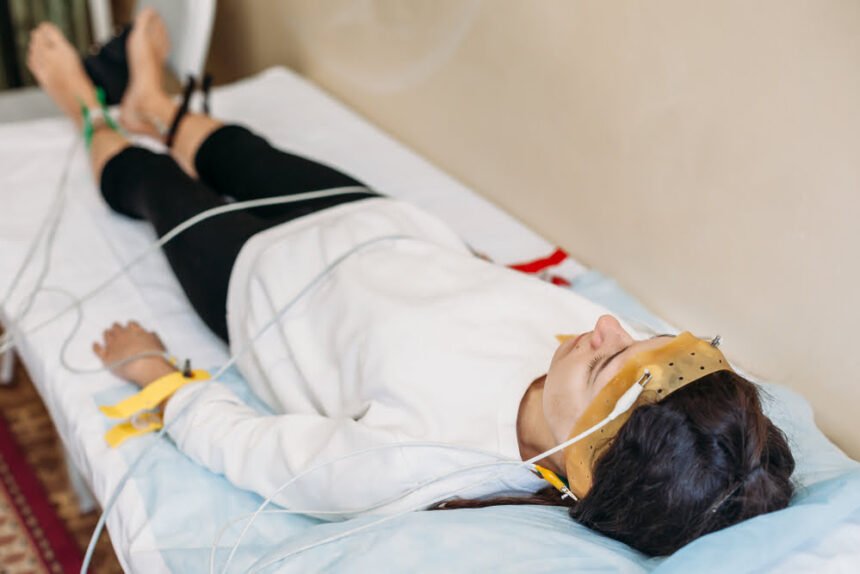Did you know that around 50-70 million people in the United States have a sleep disorder? The good news is that there are things you can do to help improve sleep quality.
Most people don’t think of sleep as a form of medicine, but it is. Just like you need to take your medication every day for your health, you also need to get a good night’s sleep every day for your health. And just like there are different types of medications, there are also different types of sleep.
A sleep study can help you determine how long you experience each type (or stage) of sleep and any problems associated with your overall sleep. Since poor quality or insufficient sleep can be seriously detrimental to your health, it is important to get treatment if your sleep quality is subpar. In this article, we’ll discuss what a sleep study is, how it’s done, and what are its benefits.
What is a sleep study?
A sleep study, also called a polysomnogram, is a test used to diagnose and treat sleep disorders. As CPAP Direct explains, it’s usually conducted overnight in a sleep lab, where you’ll be monitored by a sleep specialist. The sleep study can help your doctor determine if you have a sleep disorder and devise a treatment plan.
What are the benefits of a sleep study?
A sleep study can help your doctor diagnose sleep disorders like insomnia, sleep apnea, and narcolepsy. It can also help determine if your sleep problems are caused by another medical condition.
If you have a sleep disorder, the sleep study can help your doctor devise a treatment plan. The treatment plan may include lifestyle changes, changes to your sleep environment, or medication.
It’s especially important to talk about sleep apnea here because, although it’s very common, it often goes undiagnosed (unless you get a sleep study).
Sleep apnea is a serious sleep disorder that occurs when you stop breathing during sleep. This usually occurs because your airway is blocked, which can cause loud snoring, gasping for air during sleep, and daytime fatigue.
If left untreated, this condition can increase your risk of high blood pressure, heart disease, and stroke. Make sure you know the signs of high blood pressure, so you can take timely measures against it.
One of the most common treatments for sleep apnea is the utilization of a CPAP (continuous positive airway pressure) device. It involves wearing a mask over your nose and mouth during sleep. The mask is connected to a machine that provides a gentle flow of air to keep your airway open.
A sleep study can also help your family get a good night’s sleep. That’s because if you have a sleep disorder, your partner or family member may also have trouble sleeping. Getting treatment for your sleep disorder can help everyone in your household get a good night’s sleep.
How is a sleep study done?
During a sleep study, you’ll be hooked up to sensors that measure your brain waves, heart rate, breathing, and eye and leg movements.
You may also be asked to wear a nasal cannula or face mask to measure the oxygen level in your blood. The sensors are generally painless and noninvasive, and you’ll be able to sleep normally during the study.
Let’s discuss this in a bit more detail.
Brain waves
These are measured by an electroencephalogram (EEG). The EEG measures the electrical activity of your brain and can show when you’re in different stages of sleep.
Eye movements
These are measured by an electro-oculogram (EOG). The EOG measures the electrical activity of your eyes and can tell doctors how much time you spend in rapid eye movement (REM) sleep each night. REM sleep is essential for high-quality rest each night, and a reduction in REM sleep will leave you tired during the day.
Muscle activity
This is measured by electromyogram (EMG). The EMG measures the electrical activity of your muscles and just like brain waves, this can let your doctor know the stage of sleep you’re in. For example, all voluntary muscles get paralyzed during the REM stage of sleep.
Heart rate and breathing
These are measured by electrocardiogram (EKG) and respiratory sensors. The EKG monitors your heart rate and can show if you have any irregular heartbeats during sleep. The respiratory sensors measure the airflow in and out of your nose and mouth and can show if you have any pauses in breathing during sleep.
Oxygen level
This is measured by a sensor placed on your finger or earlobe. The sensor measures the amount of oxygen in your blood. In patients with sleep apnea, blood oxygen saturation may drop, which can help doctors diagnose the condition.
How should you prepare for a sleep study?
You should plan to sleep in the sleep laboratory the night of your sleep study. You may be asked to arrive a few hours before your usual bedtime so the technicians can attach the sensors.
Once the sensors are in place, you’ll be able to go about your evening as usual. You should try to stick to your normal bedtime routine, so you’ll be sleepy when it’s time to go to bed. You may be asked to avoid caffeine and alcohol for a few hours before the sleep study because they can interfere with sleep.
You should also bring a list of any medications you’re taking, as well as any allergies you have.
Finally, make sure you avoid napping during the day of your sleep study, so you can fall asleep at the right time.









